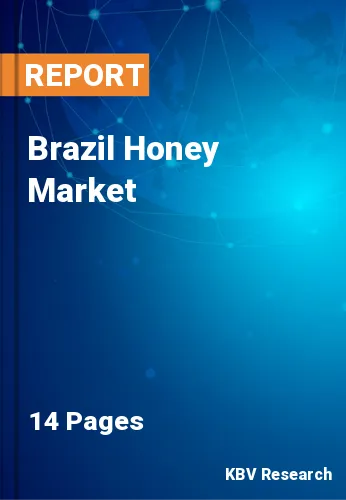The Brazil Honey Market would witness market growth of 11.4% CAGR during the forecast period (2020-2026). Honey is a thick, viscous natural product produced by bees and other insects. Honeybees collect the nectar of flowers and modified it by their digestive enzymes and regurgitation activity. They deposit it in honeycomb where it loses its moisture to some extent and becomes thick. The beekeepers then extract the honey, purify it and make it ready for sale.
Brazil has its own characteristics of climate, diverse flora, and fauna, thus have great biodiversity. Due to this, Brazilian honey has its own characteristics of taste, quality, purity, and originality. Brazil has the highest potential to produce natural honey. It is reported that the production of honey reached a peak in the past 10 years in Brazil. According to Statista, about 46 million Kg of honey produced in the country in 2019.
Brazilian honey is well-recognized in the world. Due to the covid-19 pandemic, the demand for healthy food items has increased substantially. The manager of the Brazilian Association of Honey Exporters stated that the demand for natural honey has been significantly increased not only in Brazil but across the world. In 2020, Brazil exported 45,626 tonnes of honey across the different parts of the world. Exports of honey from Brazil are still largely concentrated in the United States that accounts for more than 75% of the market supply. On the other hand, the domestic demand is expected to increase over the upcoming years.
Massive efforts have been made by global organizations to develop protocols that mainly aim to identify and evaluate the quality of honey. The Technical Regulations for Honey identity and Quality of the Ministry of Agriculture, Livestock, and Supply (MAPA) in Brazil issued a set of guidelines to check the quality of honey. The samples should be tested by physical and chemical procedures including moisture determination, minerals content, acidity, apparent sucrose, and reducing sugars. If the sample fulfills all the criteria then only it can be called natural honey. Furthermore, the beekeepers in Brazil mostly keep the hives in native areas; hence the honey produced is free of pesticides. That is why several Brazilian honeybee products have been awarded in international competitions and fair for their purity.
The honey production is regulated and managed by the Ministry of Agriculture of Brazil. Quality control analyses play an important role in the evaluation quality, storage conditions, adulteration, and contamination of honey. Honey possesses antibacterial properties and thus has low susceptibility to microorganisms. The low moisture content, low pH, and oxidation-reduction potential of the honey inhibit the growth of many microorganisms including bacteria and fungi.
The Ministry of Agriculture, Livestock, and Supply (MAPA) of Brazil published a report on the Technical Regulation of Identity and Quality of Honey. According to this report, analysis of contaminants in honey must follow the Technical Regulation of the Southern Common Market to pass the criteria of contaminant-free honey.
The Brazilian market has been severely affected by the outbreak of COVID-19. . The complete shutdown of the Brazilian market made the seasonal worker to struggle for their livelihood. For this, the French government extended its help to the local beekeepers. According to World Trade Organization, there was an approximately 12.9 percent drop in global merchandise trade in 2020. The Minister of Economy of Brazil, Paulo Guedes announced an economic stimulus package to compensate for the loss. The Federal Government of Brazil has taken Provisional Measure (MP) that alters labor regulations during the pandemic focused on preserving helping companies and preserving jobs. So it is expected that the honey market will gain its pace in export and import as well as domestic production.
In general, honey contains more than 200 substances. Sugars, amino acids, proteins, organic acids, flavonoids, phenolic acids, vitamins, minerals, and volatile compounds are major components of honey. Honey possesses distinct composition & chemical properties and can be stored for a longer period of time. Due to its nutritional benefits and medicinal properties, the demand for honey is very high among health-conscious people. Natural honey is healthy and has properties that strengthen the immune system. The WHO recommends the use of honey for the treatment of cough and sore throat. Moreover, honey is also proven to be helpful in healing wounds. Honey is commonly used in processed foods, beverages, jellies, and jams.
By Application
By Distribution Channel
Our team of dedicated experts can provide you with attractive expansion opportunities for your business.

